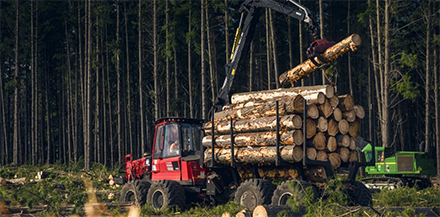Up to 500 forestry jobs could be lost in South Australia’s Green Triangle by Christmas if China’s ban on Victorian timber remains unresolved, according to the CFMEU. China is no longer accepting log exports from Victoria, citing concerns about the detection of live bark beetle in consignments from the state. Source: Timberbiz
Most of the logs exported to China from South Australia are sent from Portland, Victoria.
The Construction, Forestry, Maritime, Mining and Energy Union’s Brad Coates a ship was being loaded in Portland however, about halfway through that process stopped and unloading began.
“There were two other ships due in the next week and they’ve been turned around,” Mr Coates said.
SA Timber Processors Association chief executive David Quill told the ABC the situation could bring opportunities for smaller, local operators.
“One of the major issues facing local processors, whether they be large or small, is the fact that this fibre is being exported, so if the exports were to cease there’s a huge opportunity for growth in this region,” he said.
“I think that would immediately bring about the potential establishment of a number of different facilities in Mount Gambier or in the Green Triangle.”
However, he said he did not believe local processors could take on all the extra resources.
“China is without question the biggest export market,” Mr Quill said.
“I think there’s going to be huge pressure on domestic processors to take additional fibre if the demand to China is stopped.
“I think the demand could be met probably to a maximum of 200,000 tonnes, so it’d still be a shortfall of 800,000 plus [tonnes per year].”
Mr Quill said the export market from the Green Triangle was one reason there had not been enough wood available for local processors to grow their operations.
“The ownership of plantation softwood plantations in this region has changed from domestic ownership primarily to overseas fund managers and … are driven by profit,” he said.
“So, what’s happened is that the volume of wood export has increased, mainly because the demand from China has increased, and therefore the price they’re prepared to pay for that wood has increased.”
Mr Quill did not think the larger domestic timber processors would be affected by the situation in the short-term.
“This will give us a chance to take a long, hard look at what we’ve been doing,” he said.
“If we want to come out of COVID, employ more people, and get this country back on its feet again, we should be increasing our manufacturing industry.
“This represents a golden opportunity to do so.”
Trade Minister Simon Birmingham again voiced concern over China’s trading behaviour, urging Beijing to respect international trade rules and “focus on evidence” when making decisions about imports of Australian products.
Labor’s regional development spokeswoman Clare Scriven said the trade barrier presented a significant threat to the state’s $1.3bn industry.
She called on the State Government to provide a support package to forestry businesses.
State Primary Industries Minister David Basham said the government was working with industry and the Federal Government.
“South Australians can support the local timber industry and jobs by supporting use of value-added timber products from our sustainably grown plantations,” he said.
“The issues are just the inability to export out of Portland, which then causes backlog issues right through the process,” he said.
“We have to try and get that resolved as quickly as possible to allow the industry to operate in the most efficient way.
“We’ll also make sure that where channels are still open and operating [that] protocols are there to make sure timber leaving there is up to standard.
“It’s a ban on exports from the ports, with that state, so our understanding at this point in time [is that] Port Adelaide, for example, is not covered by the ban.”
He said conversations with the timber industry were needed to determine whether exporting from other ports was “feasible”.
“It’s not something you can just turn on and off overnight, to implement that sort of approach, to have a complete redirection,” he said.
However, Mr Quill said alternative ports would likely be unviable options.
“Currently, the total volume of softwood material being exported out of Portland is slightly in excess of a million tonnes a year,” he said.
“Port Adelaide — you’d be adding a cost of about $30 to every tonne of wood.
“Exported through Geelong, you’d be adding a cost of something in the order of $25-$28 a tonne, which would make [both of them] cost-prohibitive.”
Beijing’s foreign ministry spokesman Wang Wenbin made his bluntest comment yet urging Australia to improve the relationship.
“Let him who tied the bell on the tiger take it off,” he said.
“One’s fault should be amended by oneself.”
The Federal Opposition said it would pore over the details of the trade deal closely but warned it could not be used as a distraction from the serious deterioration of the relationship between Canberra and Beijing.
Australian ministers have not been able to talk to their Chinese counterparts for months.
“We’ve got big problems with China at the moment, getting goods into China,” Labor frontbencher Jason Clare said.
“It’s pretty extraordinary that after being in government for seven years, this Government can’t get anyone in Beijing to answer the phone.
“The bottom line is, when you’ve got a country which is your biggest trading partner — we make one in three dollars from trade from China — then you’ve got to lean into it and make sure you’ve got the contacts in China to fix things when there’s a problem,” Mr Clare said.







